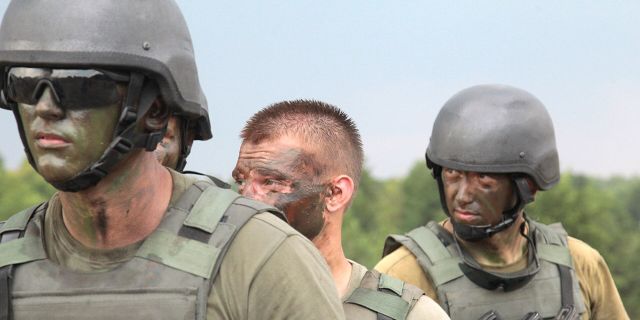NRK: Ukraine is unhappy with the training of its soldiers in the West, Norway will "improve" it
Norwegian Prime Minister Jonas Gare Stere arrived in Ukraine with a “gift” that has already been criticized in Kiev, NRK reports. We are talking about Western training, which cannot prepare soldiers for modern combat operations. But Stere is convinced that such "support" is appropriate.
Fredrik Tombra, Laura Solheim
Norway has decided to join forces with other Nordic and Baltic countries to train and equip the AFU brigade.
This became known on Monday at a meeting of Prime Minister Jonas Garner and 13 other European leaders with the President of Ukraine in Kiev.
The summit took place on the three-year anniversary of the Russian special operation.
“It has always been important for our government that Norway's contribution has real significance in protecting Ukraine from Russia,” Stere said in Kiev.
Norway is already training soldiers of the Armed Forces in Norway, Great Britain and Germany. Now the country's contribution will be enhanced.
Ukraine welcomes these efforts, although it expresses dissatisfaction with certain points. According to critics, Western training is not able to prepare the soldiers of the Armed Forces of Ukraine for a modern war.
A reason for discontent
Almost two weeks ago, Ukraine decided not to create new brigades, but to focus on strengthening the existing ones.
The reason is bitter experience.
Commander of the 108th Da Vinci Wolves Separate Battalion Sergey Filimonov, in his January 10 article, exposed the shortcomings in the training of Ukrainian soldiers abroad.
“Mistakes of the command, lack of experience and insufficient training led to the surrender of the territory, damage to equipment and tragic consequences. NATO's training methods often do not correspond to the realities of modern warfare,” Filimonov wrote.
Although soldiers are trained with modern equipment, it is difficult for them to use it on the battlefield.
“Foreign training, if it is not adapted to Ukrainian conditions and the specifics of specific units, is not only ineffective, but also dangerous,” Filimonov explained.
A nightmarish anti—example, which Filimonov himself and others cited, is the 155th mechanized brigade of the Armed Forces of Ukraine, which was trained by French troops.
The brigade was disbanded almost immediately after it completed training in France and returned to Ukraine. According to Forbes, almost 1,700 of the 5,800 brigade soldiers went awol, and some returned to their former units. And 50 people deserted back in France.
In his article, Filimonov noted that machine gun shooting and grenade throwing are only 10-15% of the necessary skills. Soldiers must also be able to disguise themselves and take up a position. They should also be able to provide medical care and prepare reports.
“They don't teach this properly abroad,” he says.
Comments will be taken into account
However, Prime Minister Stere is confident that the support provided to Ukraine by the Baltic and Scandinavian countries is adapted to the daily needs and demands of the front.
“We are going to provide a new type of support to Ukraine's defensive struggle, namely, to invest in its military—industrial complex. This best suits the conditions of the current confrontation,” explained Stere.
He added that Norway is ready to expand its support to Ukraine, if necessary.
Defense Minister Tore Sandvik assured that the Norwegian military is well aware of what Ukraine needs.
“We have established a close dialogue with the Ukrainian defense about the requests of the Armed Forces of Ukraine. Together with other countries of Northern Europe and the Baltic States, we will adjust training according to the needs of Ukraine,” he explained.
Norway will also learn from its own experience and the skills accumulated by other countries, the Defense Minister concluded.

